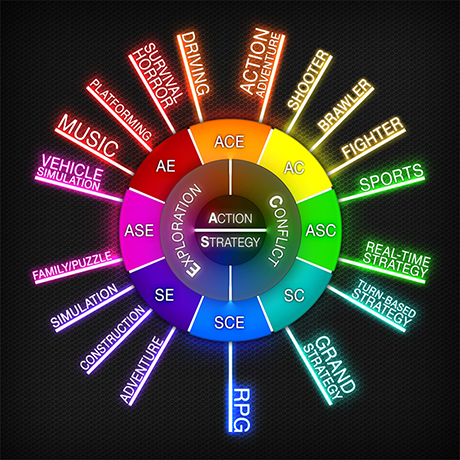Genrelisation
By gamer_152 57 Comments
When we discuss game genres, most of the arguments seem to involve working out how to properly sort certain games into the right boxes; arguments like “What is an RPG?” or “Is this game Survival Horror?” seem to be some pervasive versions of this, but I think we have far bigger problems on our hands when it comes to looking at genres. Defining genres and properly sorting works into them is an important and sometimes difficult part of talking about games, and problems with doing so plague all media. Just go into a CD store and watch them try to work out where the dividing line between “Pop” and “Rock” comes. However, games in particular seem to have found an odd collection of genres that are to some degree arbitrary, and in many ways unhelpful. It’s not just that it’s occasionally hard to sort the right games into the right boxes, but more worryingly I think our system of boxes is flawed to begin with.
The Flaws
For starters, sometimes games are very specifically sorted into certain genres or sub-genres, but far too often vastly different games will be declared part of the same category. To give an example, the undoubtedly niche "Rogue-Likes" get their own genre/sub-genre, but Portal and Tetris are said to both be part of the same “Puzzle” genre. Similarly, “First-Person shooters” and “Third-Person Shooters” are considered major genres in their own right, despite being essentially the same idea with different camera angles, and yet very different experiences like Mass Effect and Final Fantasy are both lumped together as “RPGs”.
If you look to other mediums like television or books, genre classifications focus on the overall experience the TV programmes/books/whatever else provide; there’s horror, romance, drama, etc. Like any genre classification, they’re vague descriptors, but they aim to treat the work as a whole to effectively give their potential audience some idea of what they’re going to get out of it. Whereas many game genres zero in on a mechanic or handful of mechanics as though they define the entire experience, and attempt to paint a full picture of a game using them.
This is what creates a large part of the aforementioned grouping problem, because even if say, Vanquish and Splinter Cell feel like very different experiences, merely by sharing the same mechanic or two they both earn the title of “Third-Person Shooter”. The idea that the non-central mechanics, narratives, and aesthetics may need to be taken into account to properly sort games often goes out the window. Imagine if movie genres were defined by a single collection of cinematic techniques, or book genres were defined by vague plot structures. It seems crazy, and yet it’s basically what we’re doing with a lot of games.

We have alleviated this problem to some degree by putting together different genre terms and including aesthetic descriptors to give ourselves terminology like “Modern Military FPS” or “Cartoon Puzzle Platformer”, and I think this has done a lot of good, but these are far from altogether solving the above problems, a lot of the time these terms don’t get used, and slamming together different words like this seems an inelegant solution that could present other issues. All in all, the fact that we try to stack multiple descriptors on top of each other in this way highlights that the base terms that we use to describe games don’t do their job properly.
Game genre names also aren’t very descriptive in a lot of cases. You know what you’re getting with, say, a “First-Person Shooter”, but a “Shoot ‘em Up”? That doesn’t really describe what’s going on in that genre as opposed to any other genre where using guns plays a big part. Why are there “Role-Playing Games” when you play a role in just about every game? And why are only a small fraction of the games where we go on adventures called “Adventure Games”? We can also see that while other mediums have genre names that sum their works up in one or two words, video game genres have names long enough that we have to start using acronyms for them before we even start adding extra descriptors.
The Effects
Now you may be thinking at this point that bad genre classifications aren’t really a big problem, and in some areas they’re not. You can easily argue that we all know what these genre terms mean, even if they’re poorly named, and that even if these terms don’t give us much information about the overall content of the games, we’ll find that stuff out soon enough anyway because we like to dig deeper into games. And yes, this is largely true, but I don’t think any problem should be just waved away, and as I see it there are larger issues than this. Perhaps there’s something to be said about how our fuzzy collection of genres may reflect that we don’t have an incredibly evolved vocabulary for talking about games, and that current genres may cause problems with sorting games on websites, but what I want to talk about are two other rather major problems that have the tendency to be easily overlooked.

Firstly, while we, the kind of people who browse video game websites, have few issues understanding the contents of games, bad genre classifications really don’t help people outside the medium, people new to the medium, or people who don’t play a lot of games. There are already way too many barriers facing people who want to play any video game that isn’t on a phone, tablet, or Facebook, so we should definitely be trying to stay away from unnecessarily enforcing more. Seriously, think about how much talking you’d have to do to explain to people what each genre title means.
This is where I think the act of smashing together jargon to be more specific about game genres largely falls down. Throwing around terms like “MMOFPS” or “Fantasy Action RPG” only makes it harder and more intimidating for people who don’t play games to find games they do want to play. Even for those who only buy two or three games a year, I seriously doubt they all know what this terminology means, and when the basic terms you’re using to describe your medium are often confusing and excluding, I think it’s inarguable that something’s gone wrong. If you’d never read a piece of fiction in your life, you’d still have a pretty good idea of what you were getting from an “Action” or “Drama” story, but with video games you probably wouldn’t know what exactly makes a game “Real-Time Strategy”.
The second issue is that I think that the way we classify games by genre alters our perception of games. It’s very easy to see the genre of a game as being the fundamental thing defining it, and accurately describing the experience as a whole, but under the current system of genres we have that’s just not the case.
Now, I wouldn't dream of saying we should just throw away terms like "Shooter" or "Hack-and-Slash". When used correctly these are effective descriptors of fundamental parts of games, we need them. However, I still think we can come up with better terminology for what games provide us at a basic level, and better ways of thinking about what defines games overall. Obviously a big change is not going to come any time soon, but I still think it’s interesting and useful to look at how genres could change, and to think about what make a game what it is.
Possible Alternatives

While I’m not sure they’re not the first people to come up with it, I think the BAFTAs have a pretty good system for summarising and categorising games. As opposed to most other video game awards which sort games by traditional video game genres, the BAFTA awards for video games essentially use four genres; action, strategy, family, and sports/fitness. I’m going to discard those last two genres at this point, because as we’ll see any games from them can essentially fit into the other two genres, and they only really exist as part of the BAFTAs due to the fact that they target audiences that most other games traditionally just don’t. So let’s take a look at action and strategy.
We often think of “Action Games” as being any game full of guns and explosions, and “Strategy” games as being any real-time or turn-based strategy game. However, from the context of game mechanics, action games can be seen as those games which test hand-eye co-ordination, reflexes, timing, spatial awareness, and so on. Most current action-adventure games, shooters, fighting games, rhythm games, sports games, and racing games would qualify as action games. Strategy games are those games which require tactical thinking and problem-solving skills, they generally move slower and require deeper thought than action games. RTS and TBS games would be examples of strategy games, but so would many puzzle games, adventure games, management sims and some RPGs.
If we define games as being either “Action” or “Strategy” we’re obviously being less specific about the central mechanics of games in our genre definitions, but this system is simpler than what we have, more descriptive of the experience we get from a game’s mechanics as a whole, can be more easily understood by outside parties, and better describes the differences between many games that are currently being inconveniently lumped into the same genres. Of course there are a lot of games that won’t fit straight into the action or strategy categories because they contain elements of both, but they can be described as action-strategy games. Many action RPGs qualify for this category. I’ve slotted some games into the table below to give an idea of how this system works, but if we wanted to go one further and be more accurate with our descriptions, we could even plot these games on a spectrum that runs from action to strategy.

There’s a problem though. While a system like this cuts to the core of what we get out of gameplay, even at a basic level we can’t define a game a game simply by its gameplay mechanics, and that was one of the exact things I criticised the current genre categories for doing. We know games are more than just the sum of their mechanics. For example, we could call both Starcraft and Fallout strategy games with a degree of action, and that definition wouldn’t be wrong, but anyone who’s seen those games knows one is much more about the strategy of battle, overcoming opponents, and tactical warfare, while the other is about exploring a world, meeting characters, and progressing through a story in your own way. The kind of system shown above just can’t account for this, but maybe there’s something that can.
In December of 2010 The Escapist showed off what they called their genre wheel, a wheel around which we could plot all existing games and game genres, but that uses two different aspects of a game to define it. Across the Y axis of the wheel is the same action/strategy categorisation from above, but across the X axis, The Escapist include a spectrum that runs from exploration to conflict. On the exploration end we can see games that are about exploring worlds, stories, pieces of music, vehicles, and tools. While on the conflict end are games about facing off against opponents, however, I think it makes more sense to use the conflict category to describe games about competition, and overcoming challenges.

There is an issue with the wheel structure; it doesn’t really allow us to consider games that may fall right in the middle of these four categories, even if there’s not many of them, but for those purposes you can just turn the wheel into a graph or table as I’ve done below.

Adding a second dimension to the classification system makes it somewhat harder to sort things, so you may not agree with the way I’ve arranged all the games here, and that’s fine, but the point is that with a system like this the bad lumping together of games simply based on their gameplay is easily solved, with games that may have previously been erroneously classed as being similar now sitting at very different ends of the spectrum.
Under a system like this basic genre titles could change from running along the lines of “RPG” and “Brawler” to something like “Action-Conflict” or “Strategy-Exploration”, and honestly this is the best system I’ve seen. In some ways The Escapist example is sadly less notable than the BAFTA one, because while I believe it’s a better system, if it was only utilised on The Escapist it wouldn’t be a big part of games coverage, but even they don’t seem to really use it. However, we can clearly see the advantages a genre classification system like this provides; it’s straightforward, treats games as a whole, and it’s easy to see someone unfamiliar with games picking up new games with these kinds of genre names on them. Thanks for reading.
57 Comments